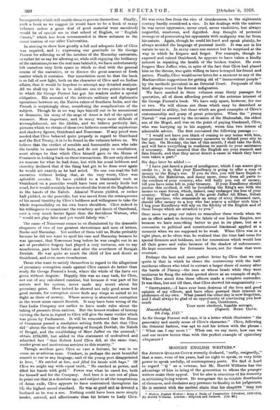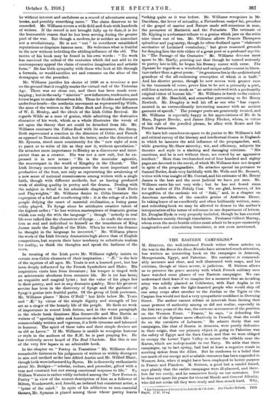MODERN ENGLISH WRITERS.*
SIR ARTHUR QUILLER-COUCH recently declared, "sadly, resignedly," that man, even of his years, had no right to speak, or very little power to speak usefully, of contemporary poets. We find it hard to regard " Q " as a veteran, but Mr. Harold Williams has the advantage of him in being of the generation to whom the younger writers make their appeal. Yet he also is conscious of his temerity in criticizing living writers. He recognises the inevitable drawbacks of closeness, and disclaims any pretence to finality in his judgments. He ill eontent with the modest claim that his chapters "may not • Modern English Writers : being a Study of b1411finative Literature, 1890-1914. By Harold Williams. London ; SkIgnick and Jackson, 1125. Cd.] be without interest and usefulness as a record of adventures among books, and possibly something more." The claim deserves to be conceded. Mr. Williams covers a wide field and deals with hundreds of writers. If the record is not brought fully up to date, it is for the honourable reason that he has been serving during the greater part of the war. But though a modern, he is neither an iconoclast nor a revolutionary. He is not " out " to overthrow established reputations or dispraise famous men. Ile welcomes what is fruitful in the new without belittling the abiding influence of the old. The motto of his book may be found in his own words : "No work has survived the ordeal of the centuries which did not add to its contemporary appeal the claim of creative imagination and artistic form." He has little sympathy with those who look at life through a formula, or would sacrifice art and romance on the altar of the demagogue or the preacher.
Mr. Williams justifies his choice of 1890 as a terminus a quo on the ground that it roughly marks the virtual end of the Victorian Aga. There was no clean cut, and there has been much over- lapping ; but in the early " nineties " new influences, tendencies, and forces began to make themselves felt. These he divides and discusses under four heads—the aesthetic movement as represented by Wilde, the aims of the writers in the Yellow Book and Savoy, the influence of W. E. Henley, and the ideals of the Irish Celtic Revival. He regards Wilde as a man of genius, while admitting the derivative character of his work, which as a whole illustrates the wreck of art upon the theory that art could be detached from life. Mr. Williams contrasts the Yellow Book with its successor, the Savoy. Both represented a reaction in the direction of Celtic and French as opposed to Teutonic ideals, but the latter, under the direction of Mr. Symons, stood more consistently for the "new right of men to paint or to write of life as they saw it, without speculation." He attaches more importance to Henley as a discoverer and inter- preter than as a creator. His was not a new cult, but he ex- pressed it in new terms : "He is the muscular agnostic, the counterpart in the world of Kingsley in the Church." The Irish literary movement he pronounces the most important and productive of the four, not only as representing the awakening of a new sense of national consciousness among writers with a single faith, though with different methods, but as having produced work of abiding quality in poetry and the drama. Dealing with the subject in detail in his admirable chapters on "Irish Poets and Playwrights," Mr. Williams denies to. Celtic literature the expression of a full and overflowing tide : it is the refuge of a little people defying the onset of material civilization, a losing game nobly played. To Synge alone he attributes creative talent of the highest order "he has written masterpieces of dramatic genius which can only die with the language " ; though "nobody in real life ever talked like the characters of Synge ... he made the conven- tion as real and individual to himself as the translators of King James made the English of the Bible. When he wrote his dramas he thought in the language he invented." Mr. Williams places the work of the Irish literary dramatists high above that of English competitors, but regrets their later tendency to substitute realism for reality, to think the thoughts and speak the fashions of the town.
In treating of the Irish poets Mr. Williams rightly insists on certain non-Celtic elements of their inspiration : " 2E." is the heir of the mystics of all ages. Mr. Yeats is not a learned poet, but has been deeply influenced by the French Symbolists and Blake. His inspiration visits him from literature ; his temper is tinged with an aristocratic aloofness from common life. He is (or has been) an exquisite and magical lyrist ; but the value of his plays lies in their poetry, and not in any dramatic quality. Here his greatest service has been in the discovery of Synge and the guidance of
Synge's genius into fruitful paths. Of the group of Irish poetesses, Mr. Williams plum "Moira O'Neill" but little below Mr. Yeats and ".E." by virtue of the simple dignity and strength of her art as a singer of the homely life of the people. He finds no work of importance in recent Irish fiction, and in the worst paragraph in the whole book dismisses Miss Somerville and Miss Martin as writers of "sporting tales and humorous sketches of Irish life. .
commendably written and vigorous, if a little tiresome and laboured in humour. The spirit of these tales and their simple devices are
Ali old as Lever." If Mr. Williams is unable to recognize humour or style in the authors of the R.M. he is past praying for. He has evidently never heard of The Real Charlotte. But this is one of the very few lapses in an admirable book.
In the chapter on "Poetry in Transition" Mr. Williams shows remarkable fairness in his judgments of writers so widely divergent in aim and method as the late Alfred Austin and Mr. Wilfrid Blunt, though both were influeneed by Byron. He is discreetly enthusiastic about Mr. Bridges—" scholar, recluse, and prosodist, gifted with a
true and constant but not strong emotional response to life." Sir William Watson is rather oddly included among the "New Forces in Poetry" in view of the correct description of him as a follower of Milton, Wordsworth, and Arnold, an isolated but consistent artist, a "lyrist of the mind." In spite of his addiction to non-essential themes, Mr. Symons is placed among those whose poetry leaves nothing quite as it was before. Mr. Williams recognizes in Mr. Davidson, the lover of actuality, a Nietzschetua emigre lui, preacher of the gospel of matter and Nature made sell-conscious in man, the precursor of Marinetti and the Futurists. The estimate of Mr. Kipling is a reluctant tribute to a genius which jars on the critic nine times out of ten. Mr. Williams allows Francis Thompson splendour and pageantry, though he often declined upon "elaborate acrobatics of Latinized vocabulary," but gives reasoned grounds for denying him the title either of a great poet or a profound mystic. In "The Passage of the Centuries" Mr. Williams devotes most space to Mr. Hardy, pointing out that though he turned seriously to poetry late in life, he began his literary career with verse. The Dynasts he regards as a wonderful and unique achievement in litera- ture rather than a peat poem : "its greatness lies in the architectural grandeur of the all-embracing conception of which it is built." And his shorter poems, though he now moves with greater ease in the trammels of verse, prove him to be not a primarily a poet, still less a metrist, so much as "an artist endowed with a profoundly original vision of human life." Mr. Williams is harsh to the violent realism of Mr. Masefield, and somewhat patronizing to Sir Henry Newbolt. Mr. Doughty is well hit off as one who "has experi- mented in an extraordinarily interesting manner with an ancient garment of speech." The younger poets are generously treated, and Mr. Williams is especially happy in his appreciations of Mr. do la Mare, Rupert Brooke, and James Elroy Flecker, whom, in virtue of his cult of the jewelled phrase, he allies with Keats and the French Parnassians.
We have left ourselves no space to do justice to Mr. Williams's full and critical survey of the literary and intellectual drama in England. in which he laments the arid influence of the propagandist, and, while granting Mr. Shaw sincerity, wit, and efficiency, eubjects his theories and style to a slashing and damaging criticism. "His emotions, and he is not without them, are cowed by an aggressive intellect." More than two hundred out of four hundred and eighty pages are devoted to the novel, of which Mr. Williams does not despair in spite of the propagandists. He attaches special importance to Samuel Butler, deals very faithfully with Mr. Wells and Mr. Bennett, writes with true insight of Mr. Conrad, and his estimate of Mr. Henry James is the best and the most judicial we have yet seen. Mr. Williams casts his net very wide ; but he has not found room for the author of The Nebuly Coat. We are glad, however, of his recognition of the sardonic wit of "Said," and, in a chapter on American novelists, of the macabre genius of Ambrose Bierce. In taking leave of an excellently and often brilliantly written, sane, and refreshing book we may be allowed to demur to the author's
interpretation of his terms of reference in one department cf letters. Dr. Douglas Hyde is very properly included, though he has exerted
his influence mainly through translation. Professor Gilbert Murray, whom even the most hostile critics must admit to be a pre-eminently imaginative and stimulating translator, is not even mentioned.



































 Previous page
Previous page